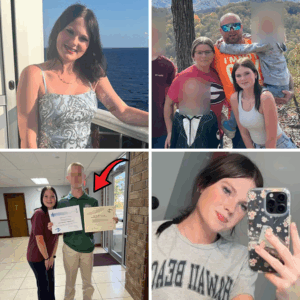Thirteen days after a routine Caribbean cruise devolved into a family’s worst reckoning, the death of 18-year-old Anna Kepner remains a spectral puzzle, its pieces scattered across federal case files and whispered family confessions. On November 7, 2025, as the Carnival Horizon carved through international waters en route from Cozumel to Miami, a housekeeper’s routine check unearthed horror in Cabin 10234: Anna’s body, bundled in a blanket and obscured by orange life vests beneath the queen-sized bed. The vibrant Titusville cheerleader, whose dreams of naval service and puzzle-filled afternoons had lit up Florida’s Space Coast, was gone—her time of death etched precisely at 11:17 a.m. by the ship’s medical team. Yet, as Thanksgiving shadows lengthen over her grieving hometown, the Miami-Dade Medical Examiner’s Office holds firm: cause and manner undetermined, toxicology reports mired in backlog. FBI agents, sifting through grainy surveillance tapes and keycard swipes, confide privately of a binary torment—murder by sibling hand or a tragic overdose in isolation? The ambiguity gnaws, transforming a floating paradise into a labyrinth of doubt, where every porthole view mocks the quest for closure.
Anna Marie Kepner arrived in the world on June 13, 2007, amid the humid embrace of Titusville, a launchpad town where rocket trails streak the sky and the Indian River Lagoon whispers of adventure. Nicknamed “Anna Banana” for her irrepressible zest—a moniker that stuck through childhood scrapes and teenage triumphs—she was the eldest in a blended brood that spanned seven siblings, a mosaic of half-blood ties forged in the fires of divorce and remarriage. Her father, Christopher Kepner, a steadfast figure in the local workforce, had parted from her mother, Heather Wright, when Anna was too young for grudges, leaving her to navigate the divides with a diplomat’s grace. By her senior year at Temple Christian School, Anna had become the family’s North Star: organizing sibling escapades to Kennedy Space Center launches or impromptu beach bonfires, her laughter a buoy against the tides of adolescent friction.
School was her stage. After stints at Titusville High, where she dazzled on the varsity cheer squad with gravity-defying flips, and Astronaut High, she settled at Temple Christian, her straight-A transcript a testament to disciplined dreams. Graduation beckoned in spring 2026, but Anna’s gaze fixed on khaki horizons. She’d just breezed through her military entrance exam, her heart set on the U.S. Navy as a K-9 handler—envisioning herself teamed with a loyal shepherd, patrolling ports and protecting the vulnerable. “She was all about service,” a youth group leader at The Grove Church recalled, her voice thick with loss. Baptized there just months prior in May 2025, Anna embodied faith’s quiet fire: volunteering at beach cleanups, crafting butterfly-themed encouragement cards for classmates, or leading puzzle nights that stretched into dawn debates on life’s bigger pictures.

Her spirit was a kaleidoscope of joys, unmarred by pretense. Blue was her hue—the endless Atlantic she adored, where dolphin pods mirrored her playful leaps. TikTok reels captured her essence: wind-whipped hair on boat decks, mock cheers to Shawn Mendes tracks, or goofy dances that drew siblings into reluctant grooves. She shunned heavy metal’s growl for pop’s uplift, favored fries dipped in ranch over gourmet pretensions, and collected jigsaw seascapes as talismans of patience. “Bubbly? That’s an understatement,” her obituary read, penned by a family still reeling. “She radiated energy—funny, outgoing, with zero filter. Kids flocked to her; she’d turn a rainy afternoon into a splash fight epic.” In a coastal enclave of rocket scientists and fishermen, Anna was the spark, her Memaw and Pepaw—Barbara and Jeff Kepner—her anchors, trading stories of Pepaw’s fishing hauls for her latest cheer routine.
The cruise was conceived as celebration, a six-day balm against the grind. Departing Miami on November 5 aboard the 133,500-ton Carnival Horizon—a gleaming colossus for 4,700 souls, with serpentine waterslides and starlit piano bars—the itinerary evoked escape: lazy days at sea, tequila sunrises in Cozumel, snorkeling off Roatan’s reefs, and a Belizean beach barbecue. Christopher, Shauntel Hudson—his wife and Anna’s stepmother—and their three younger children boarded with Anna in tow, her suitcase a riot of azure sundresses and a worn puzzle book. Early hours shimmered with promise: Instagram stories of Anna mid-laugh at the Lido Deck buffet, her arm slung around stepsister Kylie, 9, or brother Connor, the family’s resident daredevil. “Sea life suits me,” she captioned one, her grin slicing through the spray like a knife through fog.
Yet, as the Horizon churned toward Mexico on November 6, under a velvet sky pricked with stars, the idyll frayed. Dinner in the bustling marketplace—tacos steaming, key lime pie glistening—turned somber when Anna demurred from seconds, her temples throbbing. “Not feeling great—headache from the waves, I think,” she said, mustering a half-smile before excusing herself to the cabin on Deck 10. The family, versed in her occasional seasick spells, waved her off with assurances of morning mimosas. Unspoken was the rooming quirk: Anna paired with her 16-year-old stepbrother, T.H., a lanky teen whose introspective silences often clashed with her vivacity. Blended families breed such proximities—spaces too tight for brewing storms—but none foresaw the tempest.
November 7 dawned with the ship’s soft sway, but Anna’s chair at breakfast gaped empty. Christopher’s texts pinged unanswered; knocks on the stateroom door rebounded into void. The hunt began piecemeal: Shauntel corralling the littles to the kids’ club, siblings scouring the gym and teen lounge where Anna had once dominated air hockey. Keycard logs, later exhumed by feds, sketched a solitary narrative for T.H.: entry at 10:42 p.m. the night before, no departure until 6:20 a.m., when he ghosted to the promenade, gaze fixed on the frothing wake. Hallway cameras, their feeds a mosaic of blurred motion, timestamped a fleeting corridor tableau around 10:50 p.m.—Anna’s familiar ponytail bobbing beside a figure akin to T.H., a murmured exchange dissolving into the door’s click.
By 11:17 a.m., the charade shattered. A steward, prodded by the persistent “Do Not Disturb” placard, breached the cabin for turndown. Peeling back the duvet revealed the unthinkable: Anna, swathed in bedding and barricaded by vests, her form contorted in the underbed crevice. Faint bruising traced her arms and neck—evocative of restraint, or perhaps a desperate thrash against unseen bonds. The space whispered cover-up: a toppled glass beading moisture on the nightstand, a charger wrenched free, the AC’s hum cloaking any nascent scents in the humid hold. No bloodied blade or shattered vial screamed accusation; just the quiet violence of concealment, amplifying the dread.
The Horizon, a hive of 4,000 oblivious revelers, shuddered under the weight. Medical staff confirmed the irreversible; the captain’s PA address urged decorum amid the diversion for an airlift that never came. Carnival’s crisis swarm sealed the deck, their presence a blue-suited cordon as the ship limped to Mahogany Bay, then Miami by November 8. Disembarkation unfolded under a media glare: FBI windbreakers flanking the gangway, Anna’s shrouded bier wheeled into a waiting van bound for the medical examiner’s chill. Preliminary autopsy yielded fragments— no overt trauma, but tissue samples dispatched for deeper scrutiny. International waters invoked federal writ; the Miami field office commandeered the helm, their maritime mandate unyielding.
The probe’s machinery whirred with forensic precision. Terabytes cascaded from Carnival: 300 cameras’ archives, swipe metadata mapping every ingress, Anna’s iPhone ghosts—last ping at 10:55 p.m., mid-text to a friend about the headache’s ebb. Interviews cascaded like aftershocks: passengers etching Anna’s comedy club giggles from the prior eve, crew parsing the family’s animated suppers, siblings sifting mundanity for menace. T.H., decamped to a relative’s under counsel’s eye, met queries with a wall of silence. The fulcrum tilted on November 17, via Brevard County family court—a collateral arena where Shauntel’s divorce from ex-husband Thomas Hudson simmered.
Her emergency motion to adjourn a custody hearing detonated the veil: “An extremely sensitive and severe circumstance” barred testimony, FBI briefings portending “criminal charges” against one minor child—T.H., unmasked in counter-filings. Thomas Hudson’s riposte alleged prior adult altercations, branding Shauntel alienating, his 9-year-old daughter imperiled. Relocation orders sequestered T.H. for the siblings’ safeguard, the household splintering under evidentiary glare. Leaks evoke a cabin conflagration: voices piercing the engine’s drone, perhaps a pilfered gadget or Anna’s “golden child” aura igniting adolescent fury. Surveillance shards— that 10:50 p.m. corridor huddle—anchor suspicion, T.H.’s dawn egress a solitary silhouette against the rail.
Yet the core eludes: murder or mishap? Bruises hint at hands-on malice—strangulation’s subtle script, or a scuffle’s echo—but toxicology’s silence on substances muddies the ink. Overdose whispers allure: a furtive pill pop for the headache, escalating to fatal fog in solitude. Seasickness meds? Illicit escape from cruise confinement? The examiner’s stasis, 13 days on, fuels the schism; agents, per off-record murmurs, chase dual vectors, their binary a cruel coin toss. No indictment yet, the FBI’s reticence a tactical fog over whirring labs and shadowed interviews.
Ripples lap at the Kepners’ fractured shore. Christopher, hollowed at Anna’s November 20 memorial—a Titusville chapel draped in blue cheer bows and dolphin plushies—gripped her pom-pom, voice fracturing over eulogies: “Our sun, snuffed too soon.” Shauntel, ensnared in custody’s vise, pleads for prayer amid self-incrimination’s specter. Heather Wright, maternal fury channeled, lobbies for onboard reforms: mandatory cabin cams, segregated teen quarters, AI vigilance in corridors. The brood—Andrew’s stoic vigils, Tim and Alex’s muffled jests, Connor and Cody’s orphaned adventures, Kylie and Brooke’s tear-streaked puzzles—huddles in the void, Anna’s TikToks a looping requiem of light.
Titusville mourns in effusions: roadside altars at Temple Christian swell with ranch-dipped fries in tribute, notes invoking her heavenly fries-and-ranch feasts. The Grove Church youth group, her baptismal kin, hosts candlelit vigils where cheers echo sans her flips. Social media swirls with sleuths—grandpa Christopher Donohue’s raw Fox News plea, decrying the “nightmare” of gleaned truths from feeds, not feds: “Adrift in questions, a second death of silence.” An uncle’s alleged claim—T.H.’s culpability known, quashed by threats of memorial banishment—stirs tabloid tempests, unverified barbs in the grief gale.
Carnival, weathering reputational swells, vows enhanced protocols: fuller data yields to authorities, counselor patrols in youth zones, hallway sentinels against the unseen. For an escapism empire, Anna’s saga is indictment—utopias afloat harbor humanity’s undercurrents, where joy’s spark can gutter in neglect. As the Horizon recommissions, its decks scoured of phantoms, the probe’s gears grind on. Indictment or innocence? Foul play’s proof or accident’s absolution? The binary taunts, 13 days become eternity in limbo’s hold.
In Titusville’s salt-kissed air, healing charts treacherous courses. Anna’s legacy—a beacon of unfiltered shine—persists in siblings’ shared silences, Memaw’s butterfly collages, the Navy recruiter’s quiet nod to her unrealized oath. The happy teen, whose energy bent waves to her will, leaves a void no autopsy can fill. As federal fog lingers, one verity endures: paradise’s decks, for all their gleam, tread thin ice over abyssal unknowns. For the Kepners, dawn breaks not with answers, but with resolve—navigating the uncharted, one heartbroken ripple at a time.




